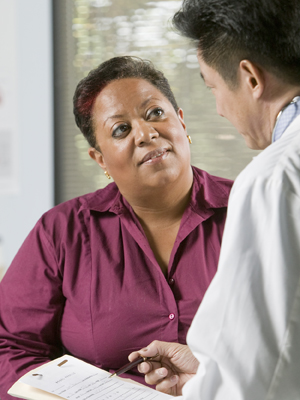If you have diabetes, be careful with alcohol. Alcohol can affect your blood sugar (glucose) level. It can also increase health risks. Before drinking any alcohol, talk with your healthcare provider. They can help you decide if you can drink safely. Read more about the risks of drinking alcohol below. And learn tips for staying safe when you drink.
How alcohol affects your diabetes
Here's how alcohol can affect your health if you have diabetes:
-
It can make some health problems worse. Alcohol may make liver, kidney, or pancreas disease worse. It may make nerve or eye damage more likely. It can also increase your blood pressure and triglycerides. If you have any of these health problems, your provider will likely tell you not to drink alcohol.
-
It can raise your risk for low blood sugar (hypoglycemia). The liver helps prevent low blood sugar. It does so by releasing more glucose into the blood. Alcohol in the blood stops the liver from doing this. Low blood sugar is more likely if you drink alcohol on an empty stomach. Or if you have alcohol during or right after exercise. It's also more likely if you take insulin or medicines that help lower blood sugar. Also, alcohol may mask symptoms of low blood sugar. This may keep you from getting needed treatment. The low blood sugar from alcohol sometimes occurs a few hours after drinking. This is even more likely if combined with exercise.
-
It can raise your risk for high blood sugar (hyperglycemia). Many alcoholic drinks have carbohydrates (carbs). These include beers, sweet wines, and drinks mixed with fruit juices or sugar. Carbs raise blood sugar levels higher and faster than other kinds of foods. Drinking may harm your ability to watch your carbs. Check your blood sugar more often when drinking alcohol.
-
It can affect how well you manage your weight. Alcohol is high in calories and has no nutrition. If you're on a meal plan to help control your weight, you'll need to count alcohol as part of your daily calorie intake. A standard drink is often counted as 90 calories or 2 fat exchanges. Also alcohol can make you feel more hungry than normal. This makes you more likely to overeat. This can affect your weight and blood sugar. Drinking alcohol can also increase the amount of belly fat and fat in the liver. This can lead to liver injury and other health problems.
Tips for safer drinking
Your healthcare provider may say it's OK to drink in moderation. Here are some steps you can take to drink safely:
-
Strictly follow the drink limits from your provider. Or use the American Diabetes Association guidelines below.
-
Check your blood sugar before drinking. Don't drink if your blood sugar is too low or too high. Also check your blood sugar after drinking or before going to bed. Alcohol can stay in the blood for many hours after drinking. If your blood sugar is low or dropping, you may be able to treat it with a snack or glucose tablet before it gets worse. In low or limited amounts, alcohol can make your body more sensitive to how insulin works.
-
If you count carbs, don't count calories from alcohol. It's not a substitute for healthy food.
-
Ask your provider how alcohol affects insulin or any medicines you take.
-
Don't drink on an empty stomach.
-
Don't drink during or after exercise.
-
Don't drink and drive.
-
Choose drinks lower in alcohol, calories, and carbs. Choices include dry wines and light beers. Or mixed drinks with sugar-free juice, club soda, or sparkling water.
-
Carry a medical ID that says you have diabetes. This helps make sure that you get the right treatment, if needed.
-
If you don't drink alcohol now, then don't start. Past studies noted that moderate drinking might have some health benefits (such as reducing risk of heart disease). But recent studies show that may not be true.
American Diabetes Association alcohol guidelines
If your healthcare provider has said it's OK for you to drink, limit drinking to:
-
Women: No more than 1 drink a day
-
Men: No more than 2 drinks a day
One drink equals:
-
12 ounces of beer
-
5 ounces of wine
-
1.5 ounces of 80-proof (hard) liquor such as vodka, whiskey, or gin


